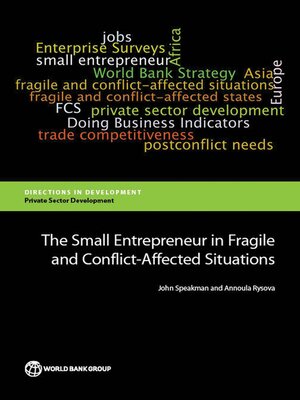The Small Entrepreneur in Fragile and Conflict-Affected Situations
ebook ∣ Directions in Development--Private Sector Development
By John Speakman

Sign up to save your library
With an OverDrive account, you can save your favorite libraries for at-a-glance information about availability. Find out more about OverDrive accounts.
Find this title in Libby, the library reading app by OverDrive.



Search for a digital library with this title
Title found at these libraries:
| Library Name | Distance |
|---|---|
| Loading... |
This book is part of a broader effort by the World Bank Group to understand the motives and challenges of small entrepreneurs in fragile and conflict-affected situations (FCS). The book's key finding is that entrepreneurs in FCS differ from those elsewhere in their characteristics and the challenges they face, and consequently may have different motives and be subject to different incentives. Therefore the book recommends that both the current analytical approach and the operational strategy of the World Bank be informed by the findings that follow. The Small Entrepreneur in Fragile and Conflict-Affected Situations summarizes the findings of recent World Bank Enterprise Surveys conducted across the World Bank Regions of Sub-Saharan Africa, South Asia, and Europe and Central Asia as well as those of the Doing Business Indicators and additional World Bank Group studies and field observations. The book finds that the majority of entrepreneurs in FCS countries head small, informal businesses, mostly concentrated in the trade or services sectors. According to the Enterprise Surveys and after controlling for the level of development (that is, gross domestic product per capita), the book finds that the average FCS firm in Sub-Saharan Africa and Europe and Central Asia produces less output than non-FCS firms the average FCS firm in Europe and Central Asia is 20 percent less likely to innovate (that is, to introduce or upgrade new products and services) than its non-FCS counterparts FCS firms start smaller and grow significantly more slowly, or even shrink (in terms of the number of employees) over time, compared with non-FCS firms in the Regions analyzed. The Small Entrepreneur in Fragile and Conflict-Affected Situations also highlights the differences in sector and business environment characteristics between FCS and non-FCS business environments.







